Unit 6 Space and beyond Listening & speaking 课件(共29张PPT,内镶嵌音频) 2024-2025学年高二英语外研版(2019)选择性必修4
文档属性
| 名称 | Unit 6 Space and beyond Listening & speaking 课件(共29张PPT,内镶嵌音频) 2024-2025学年高二英语外研版(2019)选择性必修4 | 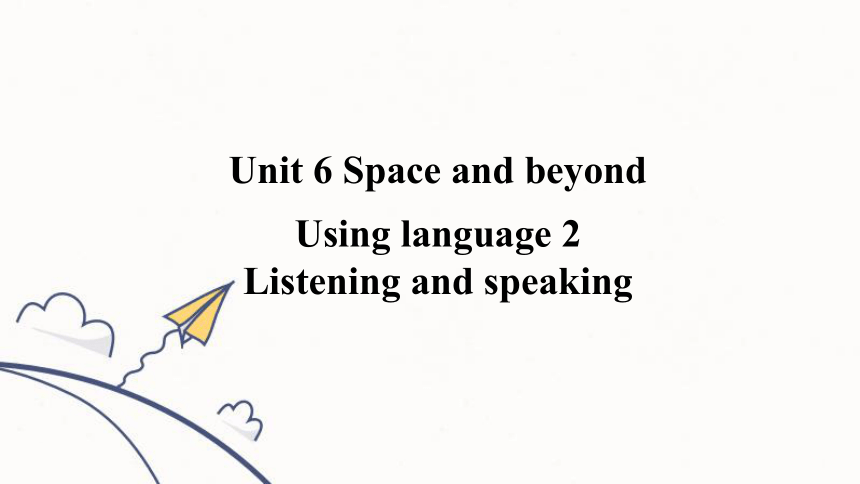 | |
| 格式 | pptx | ||
| 文件大小 | 9.1MB | ||
| 资源类型 | 教案 | ||
| 版本资源 | 外研版(2019) | ||
| 科目 | 英语 | ||
| 更新时间 | 2025-04-22 17:31:49 | ||
图片预览

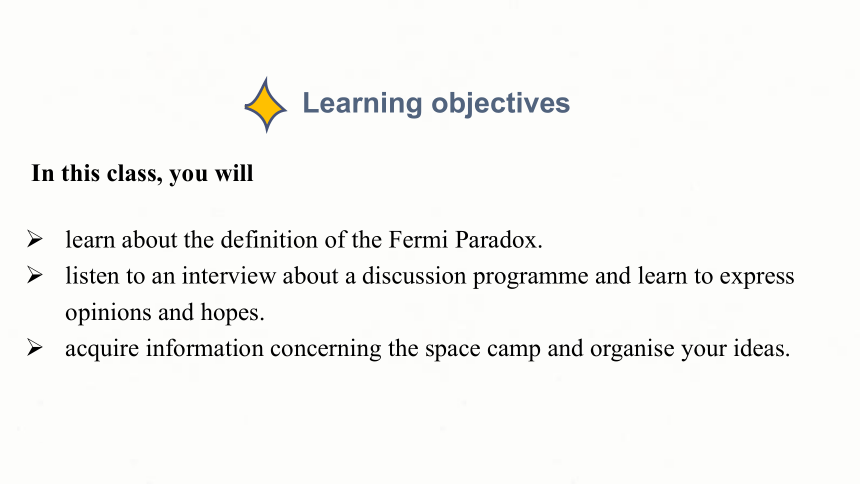
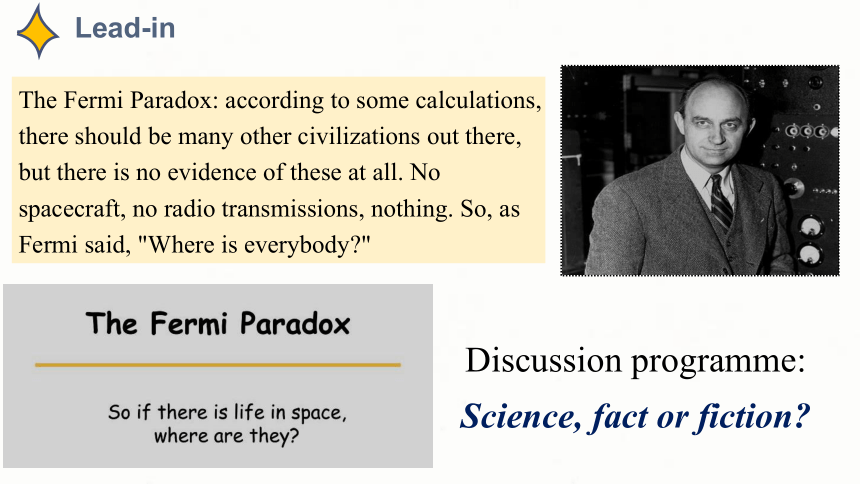
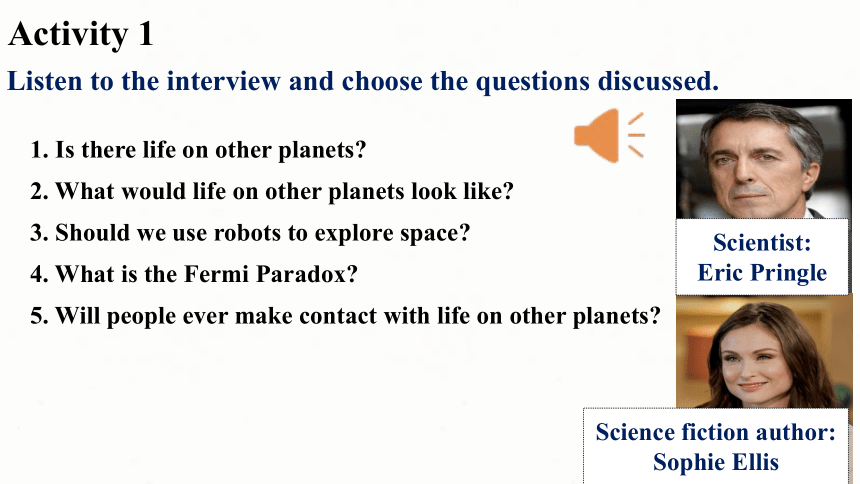
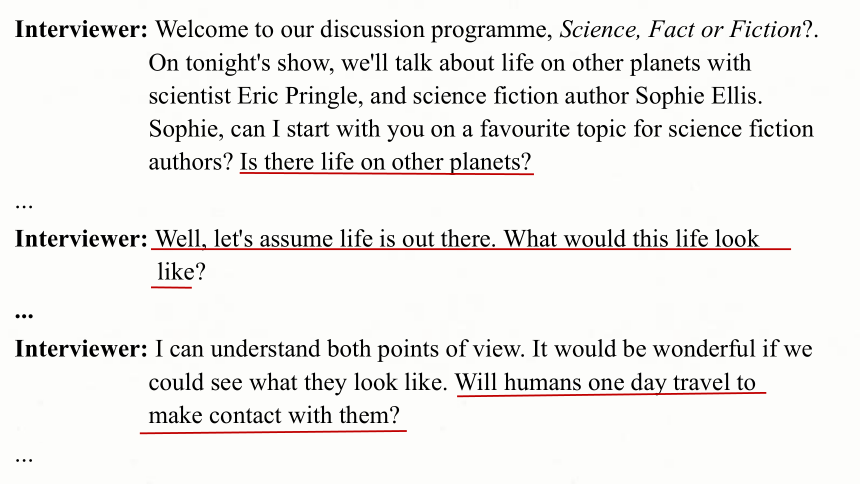
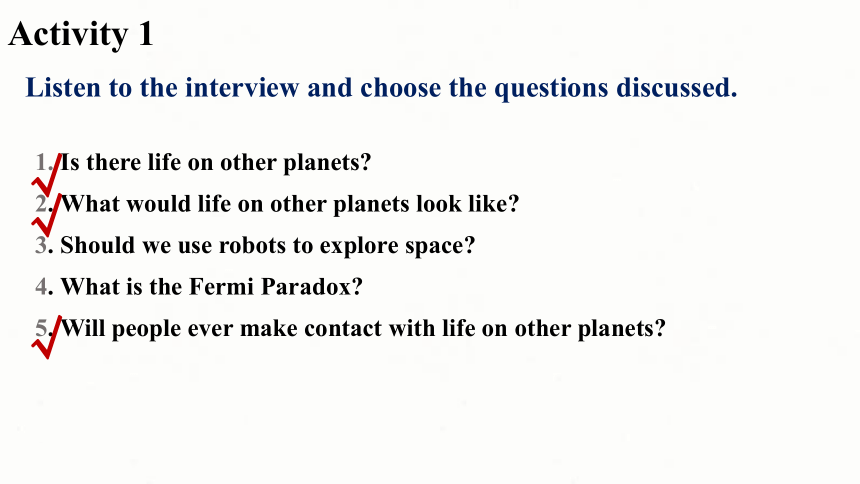

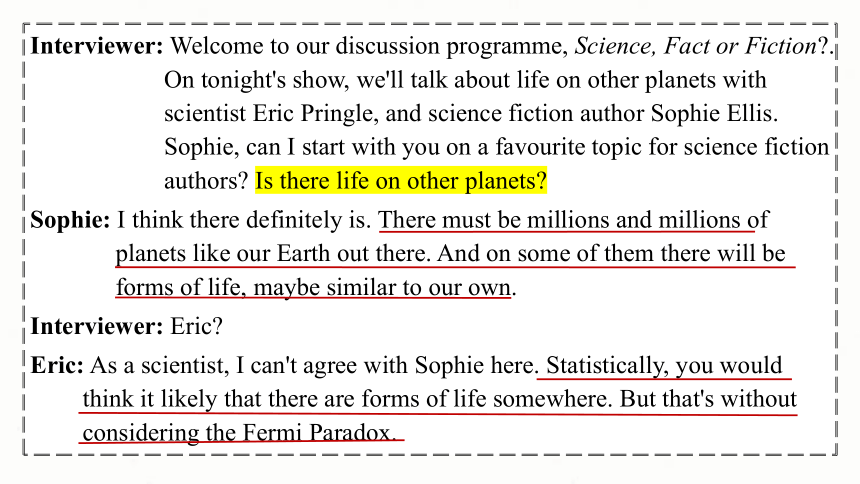

文档简介
(共29张PPT)
Using language 2
Listening and speaking
Unit 6 Space and beyond
In this class, you will
learn about the definition of the Fermi Paradox.
listen to an interview about a discussion programme and learn to express opinions and hopes.
acquire information concerning the space camp and organise your ideas.
Learning objectives
The Fermi Paradox: according to some calculations, there should be many other civilizations out there, but there is no evidence of these at all. No spacecraft, no radio transmissions, nothing. So, as Fermi said, "Where is everybody "
Discussion programme:
Science, fact or fiction
Lead-in
Activity 1
Listen to the interview and choose the questions discussed.
1. Is there life on other planets
2. What would life on other planets look like
3. Should we use robots to explore space
4. What is the Fermi Paradox
5. Will people ever make contact with life on other planets
Scientist:
Eric Pringle
Science fiction author:
Sophie Ellis
Interviewer: Welcome to our discussion programme, Science, Fact or Fiction . On tonight's show, we'll talk about life on other planets with scientist Eric Pringle, and science fiction author Sophie Ellis. Sophie, can I start with you on a favourite topic for science fiction authors Is there life on other planets
...
Interviewer: Well, let's assume life is out there. What would this life look like
...
Interviewer: I can understand both points of view. It would be wonderful if we could see what they look like. Will humans one day travel to make contact with them
...
Listen to the interview and choose the questions discussed.
1. Is there life on other planets
2. What would life on other planets look like
3. Should we use robots to explore space
4. What is the Fermi Paradox
5. Will people ever make contact with life on other planets
√
√
√
Activity 1
Listen again and complete the table.
Q1 Is there life on other planets
Answers Sophie: There must be millions of planets like ours, and some could have life 1 ___________________.
Eric: You would think it likely that 2 _____________________________. But that’s 3________________________the Fermi Paradox.
Activity 2
Interviewer: Welcome to our discussion programme, Science, Fact or Fiction . On tonight's show, we'll talk about life on other planets with scientist Eric Pringle, and science fiction author Sophie Ellis. Sophie, can I start with you on a favourite topic for science fiction authors Is there life on other planets
Sophie: I think there definitely is. There must be millions and millions of planets like our Earth out there. And on some of them there will be forms of life, maybe similar to our own.
Interviewer: Eric
Eric: As a scientist, I can't agree with Sophie here. Statistically, you would think it likely that there are forms of life somewhere. But that's without considering the Fermi Paradox.
Listen again and complete the table.
Q1 Is there life on other planets
Answers Sophie: There must be millions of planets like ours, and some could have life 1 ___________________.
Eric: You would think it likely that 2 ________________________. But that’s 3_____________________the Fermi Paradox.
similar to our own
there are forms of life
without considering
Activity 2
Listen again and complete the table.
Q2 What would life on other planets look like
Answers Sophie: Life on other planets won't look like us because 4__________________________________________.
Eric: Because evolution 5 ______________________________________, life on other planets is likely to look like us.
Activity 2
Interviewer: Well, let's assume life is out there. What would this life look like
Sophie: Since conditions on other planets won't be like those on Earth, it isn’t reasonable to think that they will be like us at all. For example, on an ocean planet, they could look like fish. It has even been suggested that on a cloud planet they could look like balloons.
Interviewer: What do you think, Eric
Eric: Well, there's evidence that evolution would work the same way everywhere, so it's actually quite likely that life on other planets would in many ways look like us. Possibly they’re smarter and more advanced.
Listen again and complete the table.
Q2 What would life on other planets look like
Answers Sophie: Life on other planets won't look like us because 4________________________________________________.
Eric: Because evolution 5 ___________________________________, life on other planets is likely to look like us.
conditions on other planets won’t be like those on Earth
would work the same way everywhere
Activity 2
Listen again and complete the table.
Q3 Will people ever make contact with life on other planets
Answers Eric: We cannot 6 _______________________,which means it would take more than a lifetime to reach planets where there might be life.
Sophie: Maybe we don't need to travel in straight lines. Perhaps we will be able to 7__________________________________________ to make contact with life on other planets.
Activity 2
Interviewer: I can understand both points of view. It would be wonderful if we could see what they look like. Will humans one day travel to make contact with them
Eric: No, I'm afraid not. This only exists in the imagination of science fiction writers. The fact that we cannot travel faster than light, 300,000 kilometres a second, means that it will take more than a lifetime to reach planets where there might be life.
Interviewer: What’s your opinion, Sophie
Sophie: I take your point, but maybe we won't need to travel in straight lines. Perhaps we will be able to take short cuts, through a “wormhole” in space, for example. The fact is the imagination of science fiction writers has often pointed the way to the future. Just think of all the predictions about space travel made by Arthur C. Clarke.
Listen again and complete the table.
Q3 Will people ever make contact with life on other planets
Answers Eric: We cannot 6 _____________________, which means it would take more than a lifetime to reach planets where there might be life.
Sophie: Maybe we don't need to travel in straight lines. Perhaps we will be able to 7__________________________________________ to make contact with life on other planets.
travel faster than light
take short cuts, through a “wormhole” in space
Activity 2
Listening text
Interviewer: Welcome to our discussion programme, Science, Fact or Fiction . On tonight's show, we'll talk about life on other planets with scientist Eric Pringle, and science fiction author Sophie Ellis. Sophie, can I start with you on a favourite topic for science fiction authors Is there life on other planets
Sophie: I think there definitely is. There must be millions and millions of planets like our Earth out there. And on some of them there will be forms of life, maybe similar to our own.
Interviewer: Eric
Eric: As a scientist, I can't agree with Sophie here. Statistically, you would think it likely that there are forms of life somewhere. But that's without considering the Fermi Paradox.
Interviewer: What do you say to that, Sophie
Sophie: I'm afraid I don't agree that the Fermi Paradox is a problem. Maybe they don't even want to communicate with us, just as we don't want to communicate with mice!
Eric: I admit that this is a possible answer to the Fermi Paradox. But we just don't know at the moment.
Interviewer: Well, let's assume life is out there. What would this life look like
Sophie: Since conditions on other planets won't be like those on Earth, it isn’t
reasonable to think that they will be like us at all. For example, on an ocean planet, they could look like fish. It has even been suggested that on a cloud planet they could look like balloons.
Interviewer: What do you think, Eric
Listening text
Eric: Well, there's evidence that evolution would work the same way everywhere, so it's actually quite likely that life on other planets would in many ways look like us. Possibly they’re smarter and more advanced.
Interviewer: I can understand both points of view. It would be wonderful if we could see what they look like. Will humans one day travel to make contact with them
Eric: No, I'm afraid not. This only exists in the imagination of science fiction writers. The fact that we cannot travel faster than light, 300,000 kilometres a second, means that it will take more than a lifetime to reach planets where there might be life.
Interviewer: What’s your opinion, Sophie
Listening text
Sophie: I take your point, but maybe we won't need to travel in straight lines. Perhaps we will be able to take short cuts, through a “wormhole” in space, for example. The fact is the imagination of science fiction writers has often pointed the way to the future. Just think of all the predictions about space travel made by Arthur C. Clarke.
Interviewer: I think you've both made good points. Thank you for being on the programme, and let's hope that one day we will find out the solution to the Fermi Paradox-and maybe contact other civilisations!
Now work in groups of three and act out the interview.
Listening text
Complete the boxes with the expressions from the interview.
I think there definitely is.
Since..., it isn't reasonable to...
There's evidence that...
It would be wonderful if...
The fact that... means...
Let's hope that...
Expressing opinions
Expressing hopes
I think there definitely is.
Since..., it isn't reasonable to...
There's evidence that...
The fact that... means...
It would be wonderful if...
Let's hope that...
Activity 3
A space camp provides a hands-on educational experience for young people interested in space exploration, covering STEM subjects, astronaut training, teamwork skills and career opportunities.
Space Camp
Activity 4
Work in pairs. Read the passage and answer the questions.
The dramatic scientific developments of recent years have brought space exploration back to public attention. As getting into space is however, still not an easy task, more and more space camps and other places are providing simulated space adventures. The Space Camp, founded in 1982 under NASA, is an educational camp, where children can learn about space travel and astronomy, and even have the chance to have lunch with an astronaut! So far, the camp has inspired hundreds of thousands of young people from the US and from elsewhere around the world. What's more, some of its ex-students have even grown up to become astronauts!
1. What is the passage mainly about
Activity 4
Work in pairs. Read the passage and answer the questions.
The dramatic scientific developments of recent years have brought space exploration back to public attention. As getting into space is however, still not an easy task, more and more space camps and other places are providing simulated space adventures. The Space Camp, founded in 1982 under NASA, is an educational camp, where children can learn about space travel and astronomy, and even have the chance to have lunch with an astronaut! So far, the camp has inspired hundreds of thousands of young people from the US and from elsewhere around the world. What's more, some of its ex-students have even grown up to become astronauts!
2. Would you like to take part in a space camp Why or why not
Activity 4
Read the advertisement for the space camp and find out what students can do there.
Activity 5
Pay attention to the words and expressions in bold.
Activity 5
Complete the email with the correct form of the words and expressions in the advertisement.
observatory\lunar eclipse\launch a model rocket\put on a spacesuit \capsule\spacewalk\zero gravity\space sick
Dear Ted,
Remember when I told you I'd signed up for the space programme Well I just got back from a week of simulated manned flight activities, and it was awesome!
We started out with some theory, learning about astronomy in the 1._______________, and then 2. ______________model rockets. After that we tried the simulator.
observatory
launched
Activity 6
observatory\lunar eclipse\launch a model rocket\put on a spacesuit \capsule\spacewalk\zero gravity\space sick
I put on a 3 ______________ and went for a walk in 4 ___________________________. It's strange to float around like that-in fact, a lot of people get 5 ______________! Luckily, I felt fine. Then I returned to the 6___________ and travelled to the "Moon“ for some lunar exploration. You should join the programme too-you'd love it!
Write soon!
Yours,
Kim
spacesuit
a world with zero gravity
space sick
capsule
Activity 6
Imagine you are going to apply for
the programme. Organise your ideas
for the short video by answering
the questions.
1. Why do you want to take part in the programme
2. What activities would you like to experience
3. What is it about space that most interests you What have you learnt
about it
Activity 7
Present your ideas for the short
video in class using the words and
expressions in this section.
Now think about how well you
structured your introduction and
what you could do to improve.
Activity 8
Using language 2
Listening and speaking
Unit 6 Space and beyond
In this class, you will
learn about the definition of the Fermi Paradox.
listen to an interview about a discussion programme and learn to express opinions and hopes.
acquire information concerning the space camp and organise your ideas.
Learning objectives
The Fermi Paradox: according to some calculations, there should be many other civilizations out there, but there is no evidence of these at all. No spacecraft, no radio transmissions, nothing. So, as Fermi said, "Where is everybody "
Discussion programme:
Science, fact or fiction
Lead-in
Activity 1
Listen to the interview and choose the questions discussed.
1. Is there life on other planets
2. What would life on other planets look like
3. Should we use robots to explore space
4. What is the Fermi Paradox
5. Will people ever make contact with life on other planets
Scientist:
Eric Pringle
Science fiction author:
Sophie Ellis
Interviewer: Welcome to our discussion programme, Science, Fact or Fiction . On tonight's show, we'll talk about life on other planets with scientist Eric Pringle, and science fiction author Sophie Ellis. Sophie, can I start with you on a favourite topic for science fiction authors Is there life on other planets
...
Interviewer: Well, let's assume life is out there. What would this life look like
...
Interviewer: I can understand both points of view. It would be wonderful if we could see what they look like. Will humans one day travel to make contact with them
...
Listen to the interview and choose the questions discussed.
1. Is there life on other planets
2. What would life on other planets look like
3. Should we use robots to explore space
4. What is the Fermi Paradox
5. Will people ever make contact with life on other planets
√
√
√
Activity 1
Listen again and complete the table.
Q1 Is there life on other planets
Answers Sophie: There must be millions of planets like ours, and some could have life 1 ___________________.
Eric: You would think it likely that 2 _____________________________. But that’s 3________________________the Fermi Paradox.
Activity 2
Interviewer: Welcome to our discussion programme, Science, Fact or Fiction . On tonight's show, we'll talk about life on other planets with scientist Eric Pringle, and science fiction author Sophie Ellis. Sophie, can I start with you on a favourite topic for science fiction authors Is there life on other planets
Sophie: I think there definitely is. There must be millions and millions of planets like our Earth out there. And on some of them there will be forms of life, maybe similar to our own.
Interviewer: Eric
Eric: As a scientist, I can't agree with Sophie here. Statistically, you would think it likely that there are forms of life somewhere. But that's without considering the Fermi Paradox.
Listen again and complete the table.
Q1 Is there life on other planets
Answers Sophie: There must be millions of planets like ours, and some could have life 1 ___________________.
Eric: You would think it likely that 2 ________________________. But that’s 3_____________________the Fermi Paradox.
similar to our own
there are forms of life
without considering
Activity 2
Listen again and complete the table.
Q2 What would life on other planets look like
Answers Sophie: Life on other planets won't look like us because 4__________________________________________.
Eric: Because evolution 5 ______________________________________, life on other planets is likely to look like us.
Activity 2
Interviewer: Well, let's assume life is out there. What would this life look like
Sophie: Since conditions on other planets won't be like those on Earth, it isn’t reasonable to think that they will be like us at all. For example, on an ocean planet, they could look like fish. It has even been suggested that on a cloud planet they could look like balloons.
Interviewer: What do you think, Eric
Eric: Well, there's evidence that evolution would work the same way everywhere, so it's actually quite likely that life on other planets would in many ways look like us. Possibly they’re smarter and more advanced.
Listen again and complete the table.
Q2 What would life on other planets look like
Answers Sophie: Life on other planets won't look like us because 4________________________________________________.
Eric: Because evolution 5 ___________________________________, life on other planets is likely to look like us.
conditions on other planets won’t be like those on Earth
would work the same way everywhere
Activity 2
Listen again and complete the table.
Q3 Will people ever make contact with life on other planets
Answers Eric: We cannot 6 _______________________,which means it would take more than a lifetime to reach planets where there might be life.
Sophie: Maybe we don't need to travel in straight lines. Perhaps we will be able to 7__________________________________________ to make contact with life on other planets.
Activity 2
Interviewer: I can understand both points of view. It would be wonderful if we could see what they look like. Will humans one day travel to make contact with them
Eric: No, I'm afraid not. This only exists in the imagination of science fiction writers. The fact that we cannot travel faster than light, 300,000 kilometres a second, means that it will take more than a lifetime to reach planets where there might be life.
Interviewer: What’s your opinion, Sophie
Sophie: I take your point, but maybe we won't need to travel in straight lines. Perhaps we will be able to take short cuts, through a “wormhole” in space, for example. The fact is the imagination of science fiction writers has often pointed the way to the future. Just think of all the predictions about space travel made by Arthur C. Clarke.
Listen again and complete the table.
Q3 Will people ever make contact with life on other planets
Answers Eric: We cannot 6 _____________________, which means it would take more than a lifetime to reach planets where there might be life.
Sophie: Maybe we don't need to travel in straight lines. Perhaps we will be able to 7__________________________________________ to make contact with life on other planets.
travel faster than light
take short cuts, through a “wormhole” in space
Activity 2
Listening text
Interviewer: Welcome to our discussion programme, Science, Fact or Fiction . On tonight's show, we'll talk about life on other planets with scientist Eric Pringle, and science fiction author Sophie Ellis. Sophie, can I start with you on a favourite topic for science fiction authors Is there life on other planets
Sophie: I think there definitely is. There must be millions and millions of planets like our Earth out there. And on some of them there will be forms of life, maybe similar to our own.
Interviewer: Eric
Eric: As a scientist, I can't agree with Sophie here. Statistically, you would think it likely that there are forms of life somewhere. But that's without considering the Fermi Paradox.
Interviewer: What do you say to that, Sophie
Sophie: I'm afraid I don't agree that the Fermi Paradox is a problem. Maybe they don't even want to communicate with us, just as we don't want to communicate with mice!
Eric: I admit that this is a possible answer to the Fermi Paradox. But we just don't know at the moment.
Interviewer: Well, let's assume life is out there. What would this life look like
Sophie: Since conditions on other planets won't be like those on Earth, it isn’t
reasonable to think that they will be like us at all. For example, on an ocean planet, they could look like fish. It has even been suggested that on a cloud planet they could look like balloons.
Interviewer: What do you think, Eric
Listening text
Eric: Well, there's evidence that evolution would work the same way everywhere, so it's actually quite likely that life on other planets would in many ways look like us. Possibly they’re smarter and more advanced.
Interviewer: I can understand both points of view. It would be wonderful if we could see what they look like. Will humans one day travel to make contact with them
Eric: No, I'm afraid not. This only exists in the imagination of science fiction writers. The fact that we cannot travel faster than light, 300,000 kilometres a second, means that it will take more than a lifetime to reach planets where there might be life.
Interviewer: What’s your opinion, Sophie
Listening text
Sophie: I take your point, but maybe we won't need to travel in straight lines. Perhaps we will be able to take short cuts, through a “wormhole” in space, for example. The fact is the imagination of science fiction writers has often pointed the way to the future. Just think of all the predictions about space travel made by Arthur C. Clarke.
Interviewer: I think you've both made good points. Thank you for being on the programme, and let's hope that one day we will find out the solution to the Fermi Paradox-and maybe contact other civilisations!
Now work in groups of three and act out the interview.
Listening text
Complete the boxes with the expressions from the interview.
I think there definitely is.
Since..., it isn't reasonable to...
There's evidence that...
It would be wonderful if...
The fact that... means...
Let's hope that...
Expressing opinions
Expressing hopes
I think there definitely is.
Since..., it isn't reasonable to...
There's evidence that...
The fact that... means...
It would be wonderful if...
Let's hope that...
Activity 3
A space camp provides a hands-on educational experience for young people interested in space exploration, covering STEM subjects, astronaut training, teamwork skills and career opportunities.
Space Camp
Activity 4
Work in pairs. Read the passage and answer the questions.
The dramatic scientific developments of recent years have brought space exploration back to public attention. As getting into space is however, still not an easy task, more and more space camps and other places are providing simulated space adventures. The Space Camp, founded in 1982 under NASA, is an educational camp, where children can learn about space travel and astronomy, and even have the chance to have lunch with an astronaut! So far, the camp has inspired hundreds of thousands of young people from the US and from elsewhere around the world. What's more, some of its ex-students have even grown up to become astronauts!
1. What is the passage mainly about
Activity 4
Work in pairs. Read the passage and answer the questions.
The dramatic scientific developments of recent years have brought space exploration back to public attention. As getting into space is however, still not an easy task, more and more space camps and other places are providing simulated space adventures. The Space Camp, founded in 1982 under NASA, is an educational camp, where children can learn about space travel and astronomy, and even have the chance to have lunch with an astronaut! So far, the camp has inspired hundreds of thousands of young people from the US and from elsewhere around the world. What's more, some of its ex-students have even grown up to become astronauts!
2. Would you like to take part in a space camp Why or why not
Activity 4
Read the advertisement for the space camp and find out what students can do there.
Activity 5
Pay attention to the words and expressions in bold.
Activity 5
Complete the email with the correct form of the words and expressions in the advertisement.
observatory\lunar eclipse\launch a model rocket\put on a spacesuit \capsule\spacewalk\zero gravity\space sick
Dear Ted,
Remember when I told you I'd signed up for the space programme Well I just got back from a week of simulated manned flight activities, and it was awesome!
We started out with some theory, learning about astronomy in the 1._______________, and then 2. ______________model rockets. After that we tried the simulator.
observatory
launched
Activity 6
observatory\lunar eclipse\launch a model rocket\put on a spacesuit \capsule\spacewalk\zero gravity\space sick
I put on a 3 ______________ and went for a walk in 4 ___________________________. It's strange to float around like that-in fact, a lot of people get 5 ______________! Luckily, I felt fine. Then I returned to the 6___________ and travelled to the "Moon“ for some lunar exploration. You should join the programme too-you'd love it!
Write soon!
Yours,
Kim
spacesuit
a world with zero gravity
space sick
capsule
Activity 6
Imagine you are going to apply for
the programme. Organise your ideas
for the short video by answering
the questions.
1. Why do you want to take part in the programme
2. What activities would you like to experience
3. What is it about space that most interests you What have you learnt
about it
Activity 7
Present your ideas for the short
video in class using the words and
expressions in this section.
Now think about how well you
structured your introduction and
what you could do to improve.
Activity 8
